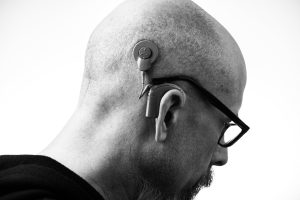Hearing Aid Evaluations
1. What is Hearing Aid Evaluations?
Hearing aid evaluations are a pivotal step in the journey toward improved hearing for individuals experiencing hearing loss. These evaluations encompass a comprehensive assessment to determine the extent of hearing loss,select the most suitable hearing aid devices, and embrace the latest in cutting-edge hearing aid technology for optimal auditory enhancement.

2. What are the causes?

Hearing loss can arise from various factors, including :
- Aging : Age-related hearing loss, or presbycusis, remains one of the most prevalent causes, affecting individuals as they grow older.
- Noise Exposure : Prolonged exposure to high-intensity noise, whether through occupational or recreational activities, can result in noise-induced hearing loss (NIHL).
- Genetics : Hereditary factors can contribute to hearing loss, with certain genetic predispositions making individuals more susceptible.
- Medical Conditions : Some medical conditions, such as otosclerosis or Meniere’s disease, may lead to hearing impairment.
- Medications : Certain medications, known as ototoxic drugs, can have side effects that impact hearing.
3. How common is the condition?
Hearing loss is a widespread concern, affecting millions of individuals worldwide. Its prevalence is notably linked to age, with the likelihood of hearing loss increasing as individuals grow older. However, it’s essential to note that hearing loss can affect people of all ages, including children and young adults.
4. What can an ENT Specialist do for you?
ENT specialists, also known as otolaryngologists, play a pivotal role in the evaluation and management of hearing loss.
Here’s how they can guide you through your hearing journey :
ENT specialists conduct a comprehensive battery of hearing assessments, including state-of-the-art audiometric tests, to pinpoint the type and degree of hearing loss.
After confirming hearing loss, the specialist conducts an exhaustive evaluation to ascertain the suitability of hearing aids, considering your specific needs and preferences.
Leveraging the latest advancements in hearing aid technology, ENT specialists can recommend cutting-edge devices that offer superior sound quality, discretion, and connectivity features.
The specialist meticulously tailors the chosen hearing aids to your unique ear shape and hearing profile, ensuring utmost comfort and exceptional auditory performance.
5. How can the condition be treated?
The cornerstone of hearing loss management is the use of hearing aids, and recent innovations in hearing aid technology have revolutionized the field.
Treatment options now include :

Hearing Aid Fitting
Once the most suitable hearing aids are chosen, the specialist expertly fits them to your ears, ensuring comfort and optimal performance.

State-of-the-Art Features
Modern hearing aids come equipped with advanced features such as noise cancellation, directional microphones, and smartphone connectivity, enhancing your overall listening experience.

Wireless Connectivity
The latest hearing aid models seamlessly connect to smartphones and other devices, allowing for effortless streaming of phone calls, music, and other audio directly to your hearing aids.

Rechargeable Options
Many contemporary hearing aids offer rechargeable batteries, eliminating the hassle of frequent battery replacement.
6. Guidelines for Surgery
Surgery is generally not the primary treatment for hearing loss but may be considered in specific cases, such as
severe or complex hearing loss, where cochlear implant surgery can provide remarkable benefits. Cochlear implants are surgically implanted devices that offer direct stimulation to the auditory nerve, enabling individuals to perceive sound more effectively.
7. Evaluation & Follow Up for Treatment
- Performance Assessment: These appointments allow the specialist to ensure that the hearing aids are functioning optimally and make any necessary adjustments to the settings.
- Patient Education: Patients receive comprehensive guidance on hearing aid care, maintenance, and strategies for improving communication in challenging listening environments.
8. Risks of Surgery
In cases where cochlear implant surgery is recommended, potential risks and complications may include infection,device malfunction, changes in taste, and minimal risks to nearby structures. However, these risks are relatively low compared to the substantial benefits provided by cochlear implants.
9. Alternatives to Surgery
For individuals with hearing loss who may not be candidates for surgery, or for those who prefer non-surgical options, there are various alternative treatments available. These include assistive listening devices, such as FM systems or captioned telephones, and communication strategies that can significantly improve understanding in challenging listening situations.
In summary, hearing aid evaluations now leverage the latest in hearing aid technology, offering a range of innovative solutions for individuals with hearing loss. With the guidance of ENT specialists and the adoption of cutting-edge hearing aids, individuals can experience enhanced auditory clarity, improved quality of life, and seamless integration with today’s digital world. Surgery remains a viable option in specific cases, demonstrating the continued advancement of medical science in the field of hearing restoration.

